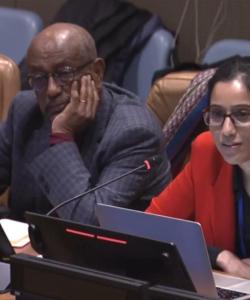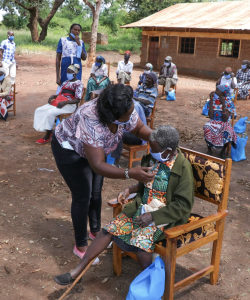The Africa Group’s call for a UN Tax Convention: Perspectives in support of the first ever inclusive and effective global tax agreement.
We witnessed a pivotal moment in the ongoing negotiations among UN Member States aimed at fostering inclusive and effective international tax cooperation with the intervention of Pooja Rangaprasad, Director of Policy and Advocacy at Financing for Development (FfD), SID as part of the event hosted by the Civil Society Financing for Development (FfD) Mechanism, in collaboration with the Global Alliance for Tax Justice.
The event, which drew global media attention, underscored the critical juncture in discussions leading up to the successful November 22nd deadline. At the forefront is the Africa Group’s draft resolution advocating for a UN tax convention, seeking to redefine and fortify international tax mechanisms for a more equitable global landscape.
Rangaprasad's intervention resonated profoundly, shedding light on the challenges faced by nations attempting to implement tax legislation. Her insights highlighted a recurring issue where countries, even when endeavoring to enact national-level tax laws, encounter legal battles initiated by powerful corporations. This dynamic has presented a substantial barrier to effective taxation and revenue generation.
The discussions held amid this pivotal moment spotlight the urgency and necessity of inclusive and equitable tax structures. The efforts of advocates for tax justice like Pooja Rangaprasad serve as catalysts for reshaping international tax cooperation. Their advocacy aims to create a more just and balanced system that empowers nations, particularly those in the Global South, to develop sustainably and independently.
The Society for International Development remains committed to fostering dialogue and collaboration towards achieving these crucial milestones in global economic governance.
To learn more about the historic Resolution's voting results please read here.
This WHA78 side event will see experts explore how the global financial system's flaws impact health financing and advocate for reforms that promote equity, sustainability, and universal access to health.
On 22 April 2025, SID joined global health leaders at a symposium in Kuala Lumpur to examine the growing influence of private actors in health governance. Convened by UNU-IIGH and Third World Network, the event brought together over 100 experts to discuss corporate power, inequality, and the urgent need for accountability in global health systems.
As part of the G2H2 Policy Debates, SID webinar on 23 Jan 2025 will explore overlooked aspects of the energy transition, emphasizing the essential steps for ensuring it is both sustainable and equitable, while also revealing the human health impacts of failing to act.
As part of the G2H2 Policy Debates, SID webinar on 22 Jan 2025 intends to shine a light on the WHO debates on the pandemic treaty, One Health and the fight against AMR, taking stock of the research work conducted in this area in past years.





